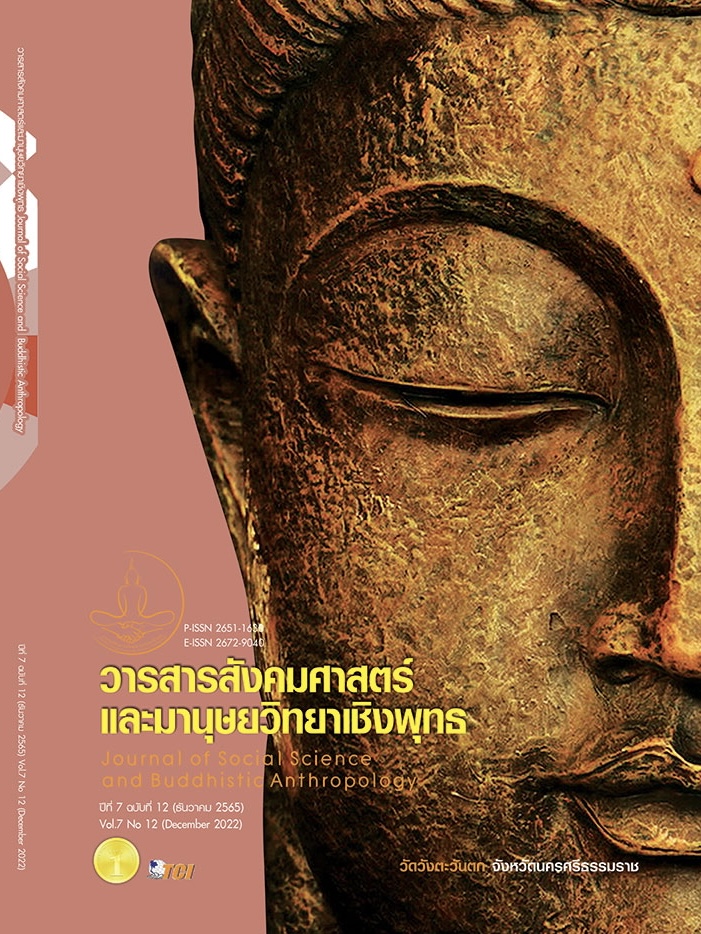การสนับสนุนตราสินค้าสำหรับธุรกิจอาหารบนสื่อสังคมออนไลน์ ในประเทศไทย
คำสำคัญ:
ธุรกิจอาหาร, สื่อสังคมออนไลน์, การสนับสนุนตราสินค้าบทคัดย่อ
บทความวิจัยนี้มีวัตถุประสงค์ 2 ประการ คือ 1) เพื่อศึกษาและวิเคราะห์องค์ประกอบของตัวแบบการสนับสนุนตราสินค้าสำหรับธุรกิจอาหารและการรับประทานอาหารบนสื่อสังคมออนไลน์ในประเทศไทย และ 2) เพื่อสร้างตัวแบบจำลองความสัมพันธ์ของการสนับสนุนตราสินค้าสำหรับธุรกิจอาหารและการรับประทานอาหารบนสื่อสังคมออนไลน์ในประเทศไทย งานวิจัยนี้เป็นงานวิจัยเชิงปริมาณ โดยกลุ่มตัวอย่างคือผู้บริโภคที่ใช้งานสื่อสังคมออนไลน์ผ่านแอปพลิเคชันอินสตาแกรมในธุรกิจอาหารและการรับประทานอาหารในประเทศไทย ที่มีอายุ 18 ปีขึ้นไปและใช้งานอินสตาแกรมมาเป็นเวลาไม่น้อยกว่า 1 ปี จำนวนทั้งหมด 737 ตัวอย่าง ด้วยวิธีการสุ่มแบบตามความสะดวก เครื่องมือที่ใช้ในการเก็บรวบรวมข้อมูล คือ แบบสอบถามออนไลน์ ซึ่งประกอบด้วยข้อคำถามเพื่อใช้วัดตัวแปรแฝงทั้งหมดจำนวน 73 ข้อ โดยใช้มาตราส่วนประมาณค่าเป็นมาตรวัด โดยผู้วิจัยได้แบ่งระดับคะแนนทัศนคติเป็น 7 ระดับ วิเคราะห์องค์ประกอบยืนยันสมการถดถอยเชิงซ้อนด้วยการใช้โมเดลสมการโครงสร้าง (Structural Equation Modeling : SEM) ผลการศึกษาพบว่า ค่าสัมประสิทธิ์อิทธิพลทุกตัวแปรเป็นบวกและสนับสนุนทุกตัวแปร ซึ่งเป็นตัวแบบจำลองความสัมพันธ์ของการสนับสนุนตราสินค้า ประกอบด้วย ตัวแปรด้านผู้ทรงอิทธิพลขนาดเล็ก ตัวแปรด้านการรับรู้ถึงแก่นแท้ของตราสินค้า ตัวแปรด้านการคล้อยตามกลุ่มอ้างอิง ตัวแปรด้านการจัดการความประทับใจ ตัวแปรด้านการใช้ตราสินค้าที่มีต่อความไว้วางใจในตราสินค้า และตัวแปรการสนับสนุนตราสินค้า ซึ่งปัจจัยที่ส่งผลมากที่สุดคือ ปัจจัยด้านความไว้วางใจในตราสินค้าที่ส่งผลต่อการสนับสนุนตราสินค้า (β = 0.668, P < 0.001)
เอกสารอ้างอิง
Aaker, D.A., & Joachimsthaler, E. . (2009). Brand Leadership. New York: Simon & Schuster.
Badrinarayanan, V., & Laverie, D. . (2013). The Role of Manufacturers’ Salespeople in Inducing Brand Advocacy by Retail Sales Associates. The Journal of Marketing Theory and Practice, 21(1), 59-72.
Bruns, I. . (2018). ‘Trust’ and ‘perceived authenticity’ in social media driven influencer marketing and their influence on intentions-to-buy of 18-24-year-olds in Ireland. Ireland: Dublin Business School.
Djafarova, E., & Rushworth, C. (2017). Exploring the credibility of online celebrities’ Instagram profiles in influencing the purchase decisions of young female users. Computers in Human Behavior, 68(1), 1-7.
Elenopoulou, C. (2018). Lifestyle micro-influencers and the practice of product endorsement on Instagram through the eyes of young female users. Retrieved May 15, 2019, from https://www.thesis.eur.nl/pub/43796/
Foong, L.S., & Yazdanifard, R. (2014). Celebrity endorsement as a marketing tool. Global Journal of Management and Business Research: E Marketing, 14(4), 37-40.
Habibi, M.R. et al . (2014b). The roles of brand community and community engagement in building brand trust on social media. Computers in Human Behavior, 37(1), 152-161.
Habibi, M.R. et al. (2014a). Brand communities based in social media: How unique are they? Evidence from two exemplary brand communities. International Journal of Information Management, 34(2), 123-132.
Habibi, M.R. et al. (2016). Testing an extended model of consumer behavior in the context of social media-based brand communities. Computers in Human Behavior, 62(1), 292-302.
Hair, J.F. et al. (2006). Multivariate data analysis. (6th ed) . Upper Saddle River, NJ: Pearson Prentice Hall.
Hair, J.F. et al. (2010). Multivariate data analysis with readings. (4th ed). Englewood Cliffs, NJ: Prentice-Hall.
Hair, J.F. et al. (2018). Multivariate Data Analysis: Pearson New International Edition. (7th ed). New York: pearson.
Hassan, M. et al. (2016). Impact of Differentiated Customer Service, Brand Trust, Brand Commitment, and Brand Salience on Brand Advocacy. International Review of Management and Marketing, 6(4), 232-238.
Keller, K.L. . (2002). Branding and Brand Equity. Cambridge: Marketing Science Institute.
Keller, K.L. (2007). Strategic Brand Management. (3rd ed). Upper Saddle River, NJ: Prentice Hall.
Kotler, P. et al. (2017). Marketing For Competitiveness: Asia To The World - In The Age Of Digital Consumers. Singapore: World Scientific.
Laroche, M. et al. (2012). The effects of social media based brand communities on brand community markers, value creation practices, brand trust and brand loyalty. Computers in Human Behavior, 28(5), 1755-1767.
Lou, C., & Yuan, S. (2019). Influencer Marketing: How Message Value and Credibility Affect Consumer Trust of Branded Content on Social Media. Journal of Interactive Advertising, 19(1), 58-73.
McCormick, K. (2016). Celebrity endorsements: Influence of a product-endorser match on Millennials attitudes and purchase intentions. Journal of Retailing and Consumer Services, 32(1), 39-45.
Pallant, J. . (2007). SPSS survival manual: A step by step guild to data analysis using SPSS for Windows (Version 15). (3rd ed). Crows Nest: Allen & Unwin.
Rai, S., & Nayak, J.K. . (2019). Hospitality branding in emerging economies: An Indian perspective. Journal of Tourism Futures, 5(1), 22-34.
Shan, Y., & King, K.W. (2015). The Effects of Interpersonal Tie Strength and Subjective Norms on Consumers’ Brand-Related eWOM Referral Intentions. Journal of Interactive Advertising, 15(1), 16-27.
Siam Commercial Bank Economic Intelligence Center [SCBEIC]. (2019). ส่องเทรนด์ธุรกิจร้านอาหาร...ยังน่าลงทุนอยู่หรือไม่? เรียกใช้เมื่อ 12 มกราคม 2563 จาก http://www.scbeic. com/th/detail/product/6167
Steven, J.P. (2009). Applied Multivariate Statistics for the Social Science. (5th ed). New York: Taylor & Francis Group.
Sultoni, M. et al. (2019). Digital Content by Online Media and Its Effects on Brand Trust, Brand Credibility, Brand Commitment, and Brand Advocacy (Case on Instagram Account Tirto.id). Singapore: IEEE.
ThaiPublica. (2559). PwC ชี้คนไทยครองแชมป์ช็อปออนไลน์มากสุดในโลก ยุค‘มิลเลนเนียล’ผู้นำโมบายช็อปปิ้ง. เรียกใช้เมื่อ 28 พฤศจิกายน 2562 จาก https://www. thaipublica.org/2016/04/pwc-18-4-2559/
Uzunolu, E., & Kip, S.M. . (2014). Brand communication through digital influencers: Leveraging blogger engagement. International Journal of Information Management, 34(5), 592-602.
Wisesight. (2019). Thailand's Influencer Report by Wisesight. เรียกใช้เมื่อ 23 October 2019 จาก https://www.influencer.wisesight.com/
Zikmund, W.G. et al. (2010). Business Research Methods. Moson, Ohio: South Western Cengage Learning.
ดาวน์โหลด
เผยแพร่แล้ว
รูปแบบการอ้างอิง
ฉบับ
ประเภทบทความ
สัญญาอนุญาต
ลิขสิทธิ์ (c) 2022 วารสารสังคมศาสตร์และมานุษยวิทยาเชิงพุทธ

อนุญาตภายใต้เงื่อนไข Creative Commons Attribution-NonCommercial-NoDerivatives 4.0 International License.









